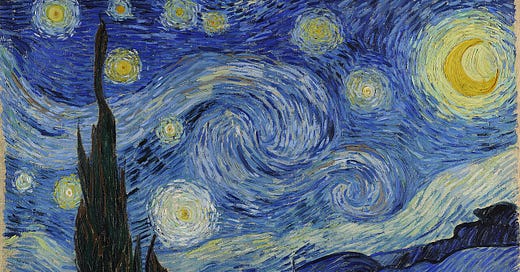"Look at the Universe.
The greatest part of it is empty space,
completely dark and unimaginably cold."1
Jovial, majestic, wholly merry,
Moving ever in joyful harmony,
Never faltering - dancing as they
Laugh, laughing as they sing - yes,
The chorus of heaven laughs,
Laughs in wondering pity, to see
Our dark simplicity, our myopic vision,
Our strange insistence on factual precision.
Even a child knows and can see
The dark dome crowded with brilliance -
Freckled with fires ancient and vigorous,
Pulsing and radiant,
Steadily enlightening the vast expanse -
Silver-leafing the night -
Even a child can see that this
Is no frozen abyss, no vast emptiness,
No spreading spill of matter, like milk tipped, dripping;
No ashes of accident.
No.
.
Here, too, we must become as little children,
Wise in wonder, who know enough to
Stare wide-eyed with innocent ignorance
At the vista of heaven, who see true
Because of, and not in spite of, distance.
They see no barren waste, no empty space,
But a garden country, a rolling pasture,
A far-reaching field of rich black soil,
Which some merry Gardener in an extravagant hour
Scattered wide with seed - a happy toil -
For glory and beauty and no other reason,
And every Night blooms with - ah!
Bright flowers in season.
A quote from the Introduction to “The Problem of Pain” by C.S. Lewis:
‘Not many years ago when I was an atheist, if anyone had asked me, “Why do you not believe in God,” my reply would have run something like this: “Look at the universe we live in. By far the greatest part of it consists of empty space, completely dark and unimaginably cold. The bodies which move in this space are so few and so small in comparison with the space itself that even if every one of them were known to be crowded as full as it could hold with perfectly happy creatures, it would still be difficult to believe that life and happiness were more than a by-product to the power that made the universe.”’




